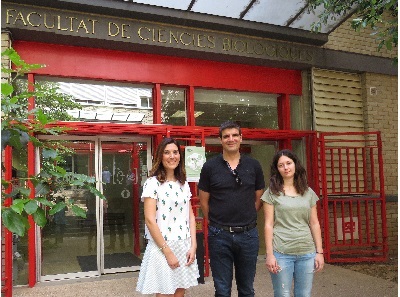A research group of the Neurobiology Unit of the faculty of Biological Sciences suggests that the onset of psychiatric diseases such as schizophrenia can be related to traumatic experiences in the early years. The study, which conducts experiments on mice, considers that this stress can cause a development alteration of the nervous system. Furthermore, the research group of the Universitat de València has created a powerful tool to investigate the neurobiological reasons of mental disorders.

Esther Castillo, Marta Pérez and Juan Nàcher, authors of this study, highlight that the stress and traumas which are caused in the early years such as the social isolation, could play an important role in the onset of psychiatric diseases, in particular the schizophrenia. According to researchers, “the aversive experiences in childhood remodel the structure and neurons connectivity as well as become a factor of predisposition to suffer from these disorders”.
“The results represents some of the alterations in terms of behaviour, structure and neurochemical, which are present in the schizophrenia”, point out the experts. One of these distresses are the instability between the inhibitory and excitatory neurons, in particular in the prefrontal cortex and tonsils.
So, the article agrees that this instability can be originated due to the changes in the expressions of the other molecules that take part in the development of the nervous system, which are affected by child traumas”. Likewise, the tests after the isolation also reveals some consequences in the animals’ behaviour. “The stress in the early years involves an increasing locomotion and some conducts related to the anxiety. These are common characteristics in schizophrenia patients”, claim Castillo, Pérez and Nàcher.
The research group has created a double impact model, which combines an isolation of mice when the breastfeeding period is finished with the injection of a substance called MK801. This component blocks an indispensable neuronal receptor for the good development of the synaptic connections.
The animals, which are divided in four groups of rodents (injected, isolated, injected and isolated, and non-injected neither isolated), undergo a test after the experimental phase. This test is called ‘holeboard test’ and monitors the anxiety level of the mouse to check the effects on its neurological system.
“The double impact model is a valuable tool for future experiments that look into the effects of traumatic experiences during the early stages and the neurological basis of mental disorders, as in the case of schizophrenia”, outline the researchers. On the other hand, the authors consider this process as a tool to look for new drugs.
Neurobiological Unit career
Juan Nàcher is professor and researcher of the Neurobiological Unit of the Universitat de València and vice-president of the Spanish Neuroscience Society (SENC). His research lines are the plasticity of the adult nervous system and its role in the aetiology and treatment of psychiatric diseases. He has collaborated in the publication of more than 90 articles in international journals. Esther Castillo and Marta Pérez are postdoctoral and predoctoral researchers of the Universitat de València, who have been granted by the Ministry for Education, Industry and Competitiveness.
Article:
Esther Castillo, Marta Pérez, Juan Nàcher et al. (2017): «Early social isolation stress and perinatal NMDA receptor antagonist treatment induce changes in the structure and neurochemistry of inhibitory neurons of the adult amigdala and prefrontal cortex», eNeuro, 2017. DOI 10.1523/ENEURO.0034-17.2017
Link: http://eneuro.org/content/early/2017/04/21/ENEURO.0034-17.2017

.jpg)







